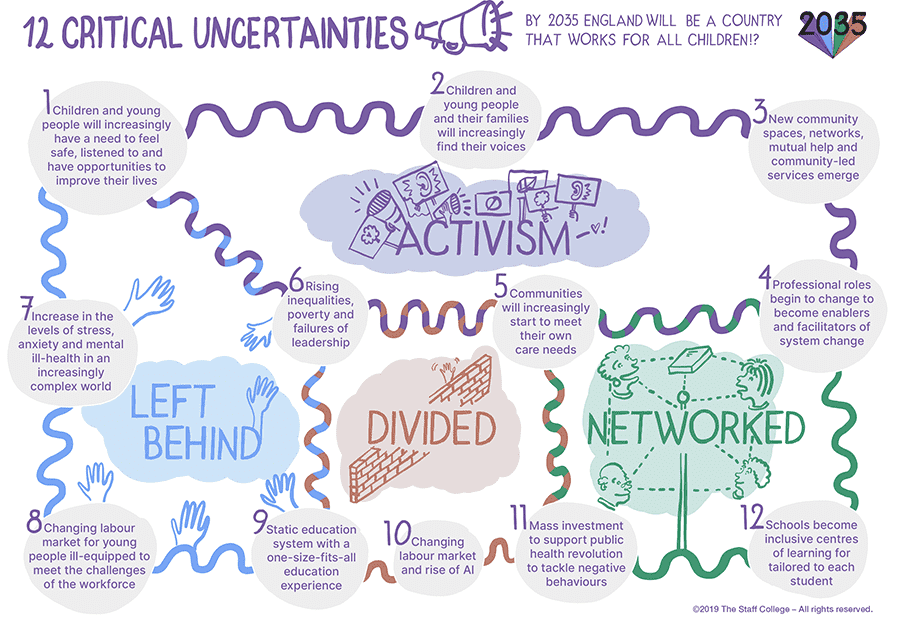About this project
Who should use Project 2035?
Anyone can read the four scenarios. The stories are broad, societal and set out very different world-views for children and young people in 2035. In their own right, they are an interesting and challenging read.
The Staff College has developed a range of ways to practically engage with the scenario materials and over the coming year we'll work with organisations and Partnerships across the country and use the scenarios to reflect, prepare and plan for the uncertain times ahead. See the many ways the College can support you use the 2035 scenarios.
Scenario ToolkitWho is behind this work?
In 2018, The Staff College began this project as a creative exploration to
- stimulate debate about the future of children's services
- offer a practical tool for groups to think critically and creatively about their leadership and practice
- offer practical hope to those working with complexity, those holding frustration and uncertainty every working day.
The Staff College would like to thank the following people who supported this work:
The Project Steering Group
The Staff College is grateful to the project Steering Group, made up from the following individuals:
- Jenny Coles, DCS, Hertfordshire
- Sarah Jones, Assistant Director, Norfolk
- Matt Dunkley, DCS Kent
- Colum Conway, Chief Executive, Social Work England
- David Fairhurst, Director, Mutual Ventures
- James Winterbottom, DCS Wigan
- Ian Thomas, Chief Executive, Kingston upon Thames
Of course, whilst the Steering Group provided critical insights, experience and expertise, the views expressed in Project 2035 materials do not necessarily reflect their own views nor the views of their organisations.
The Staff College would also like to thank the following people and organisations for their input to the research phase of Project 2035 including, the amazing young people at Click, Wandsworth’s Children in Care Council, the Young People’s Council, North Yorkshire, the Influence and Participation team at North Yorkshire, all the individuals who took part in telephone research interviews for this project and, of course, ADCS for producing so high quality baseline data from their Safeguarding Pressures research.
What is the evidence base?
A data workbook was prepared as a repository for key research, opinion, and views expressed in relation to Project 2035.
Download data workbookProject Approach and Methodology
Project 2035 involved a number of different phases including:
- Phase one - analysis of ADCS Safeguarding Pressures Research
- Phase two - futures telephone research interviews with a range of sector leaders
- Phase three - driver workshops with children and young people
- Phase four - testing emerging critical uncertainties with the 2019 Staff College ‘Aspiring Directors’ Programme
- Phase five - Steering Group testing
- Phase six - scenario roll out and creative writing, based on materials collected within the project data workbook
- Phase seven - development of project toolkit and launch
Scenario methodology
The team adopted The Staff College’s own ‘exploratory’ method of scenario planning (as opposed to a normative approach) and relied heavily on exploring the relationships between twelve ‘critical uncertainties’ identified during the research phase. Those drivers can be seen in the diagram below which sets out the relationship between the drivers and shows how the scenario spaces were ultimately formed.
Select image to expand & view in detail
- Children and young people will increasingly have a need to feel safe, listened to and have opportunities to improve their lives
- Children and young people and their families will increasingly find their voices
- New community spaces, networks, mutual help and community-led services emerge
- Professional roles begin to change to become enablers and facilitators of system change
- Communities will increasingly start to meet their own care needs
- Rising inequalities, poverty and failures of leadership
- Increase in the levels of stress, anxiety and mental ill-health in an increasingly complex world
- Changing labour market for young people ill-equipped to meet the challenges of the workforce
- Static education system with a one-size-fits-all education experience
- Changing labour market and rise of AI
- Mass investment to support public health revolution to tackle negative behaviours
- Schools become inclusive centres of learning for tailored to each student
